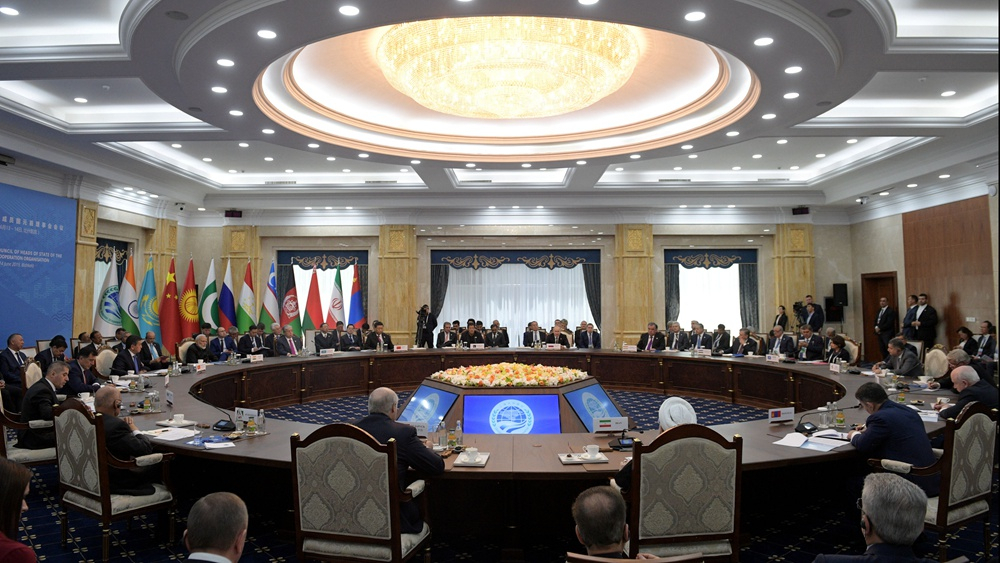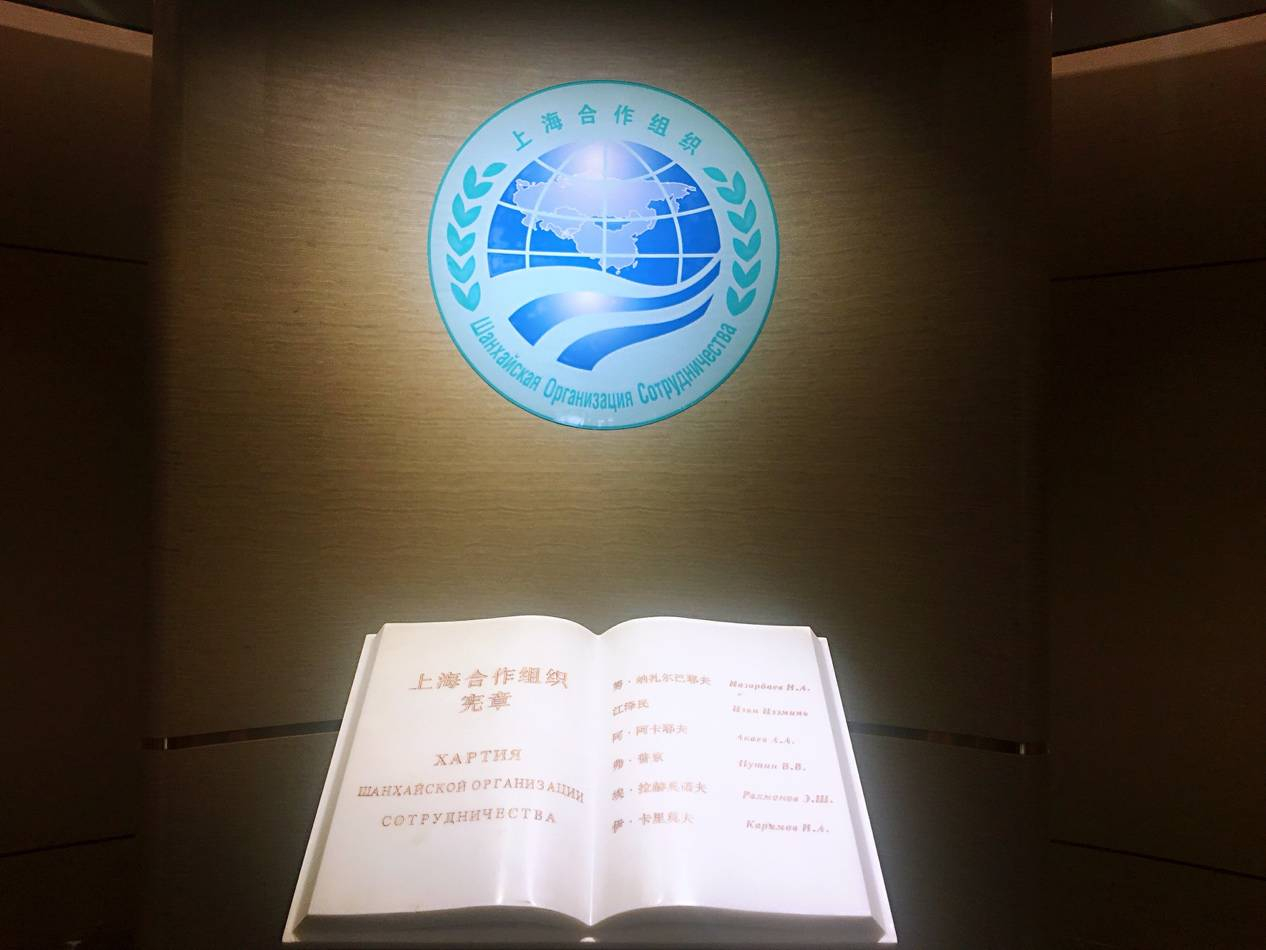

Editor's note: Xu Qinduo is the former chief correspondent of China Radio International to Washington, DC, and a senior fellow of the Pangoal Institution. The article reflects the author's opinions, and not necessarily those of CGTN.
How are we going to address the overwhelming challenges in today’s world, either man-made crisis, such as the trade wars launched by the U.S. against its partners, or natural disasters as a result of climate change? What does the rest of the world do if the world’s only super power is basically sabotaging the rules-based global order?
It’s a matter of global governance, which was also the question being touched upon at the just-concluded summit meeting of the Shanghai Cooperation Organization (SCO) in Bishkek, Kyrgyzstan.
Chinese President Xi Jinping, who delivered a speech at the two-day conference from June 13 to 14, is directly calling for the protection of the international system centered on the United Nations as well as the multilateral free trade mechanism.
As is known, the U.S. has withdrawn from a number of UN agencies, including the Human Rights Council, UNESCO, and the Paris Agreement on climate change. The U.S. is holding it due contribution of 852 million U.S. dollars to the UN, while UN Secretary-General Antonio Guterres warns of the dire situation of running out of cash.
Following the “America First” principle, Washington has been imposing tariffs on products from its trading partners. Its latest move has targeted India by withdrawing duty-free benefits for Delhi’s exporters. And it threatens with further tariffs on some 300 billion U.S. dollars’ worth of Chinese goods.
Many of the countries have fought back by launching their own retaliatory tariffs on U.S. products. Consequently, the unilateral approach and the protectionist measures in Washington have contributed to the malaise of the global economy and a potential financial crisis in the near future.

The Charter Hall of the Shanghai Cooperation Organization's (SCO) Secretary building. /CGTN Photo
Another side of the unilateral approach has been the near collapse of the most important multilateral trading mechanism, the World Trade Organization. The U.S. is blocking appointments to the WTO’s Appellate Body. If it continues, the world’s top trade court will have only one of its seven members left by year’s end, effectively rendering the WTO into paralysis.
SCO, which was established in 2001, and groups some key members of the international community, such as China and India, the two largest emerging economies, as well as four nuclear powers – Russia, China, India and Pakistan. Other members are Kazakhstan, Kyrgyzstan, Tajikistan, and Uzbekistan.
While the plea by Xi was made toward the entire international community, what can SCO, as a regional body, do to play its role to rebuff the trend of irresponsible unilateralism?
For example, the U.S., following the willful withdrawal from the Iranian nuclear deal in 2018, resumed economic sanctions on Iran. Aiming to create maximum pressure, Washington made it punishable if any company dares to continue to do business with Tehran, the so-called long-arm jurisdiction.
Well, one way to avoid the potential sanctions is to minimize the use of U.S. dollar in international settlement. The European Union has created its own payment system to evade the undue U.S. interference. Can’t the SCO do the same? After all, there’s strong incentive for China and India to keep intact their business relationship with Iran, as both nations rely on oil from the Middle East country.

Chinese President Xi Jinping and his Kyrgyz counterpart Sooronbay Jeenbekov have a meeting at the presidential residence right after the Chinese president arrives in Bishkek, Kyrgyzstan, June 12, 2019. /Xinhua Photo
Another instance would be for SCO to be more innovative to break the tariff war. As the U.S. chooses not to play along the multilateral rules governing global trade, what about the rest of the world forming a new trading block by reforming the WTO? If Washington insists on going alone, then it may have itself isolated.
Yes, it’s a complicated and challenging job to blaze a new path. But, by simply suggesting a new direction, SCO can be more vocal and more active in addressing an embarrassing situation in which global trade is being taken hostage by a single nation.
In order to unleash its huge potential, SCO needs to continue to do a sound job in cracking down on the three forces – extremism, separatism and terrorism. As ISIS has been defeated in Syria and Iraq, its fighters are believed to be fleeing back to their home countries or a third foreign country. Afghanistan is believed to have drawn a great number of those militants.
Many SCO members are close to Afghanistan and could face a spillover effects in terms of the threat of terrorism. That requires the unity of SCO member countries to effectively handle the challenge.
Beyond security will be economic development, a common priority for all SCO members. With growing investment and trade in projects under the trillion-dollar Belt and Road Initiative, countries are going to enjoy the fruits of connectivity – more jobs, more revenue, higher living standards, and a prosperous SCO community.
Following the principle of “wide consultation, joint contribution and shared benefit,” the SCO will be built into what President Xi called a “role model” for other regional and international organizations.
(If you want to contribute and have specific expertise, please contact us at opinions@cgtn.com)

Copyright © 2018 CGTN. Beijing ICP prepared NO.16065310-3
Copyright © 2018 CGTN. Beijing ICP prepared NO.16065310-3